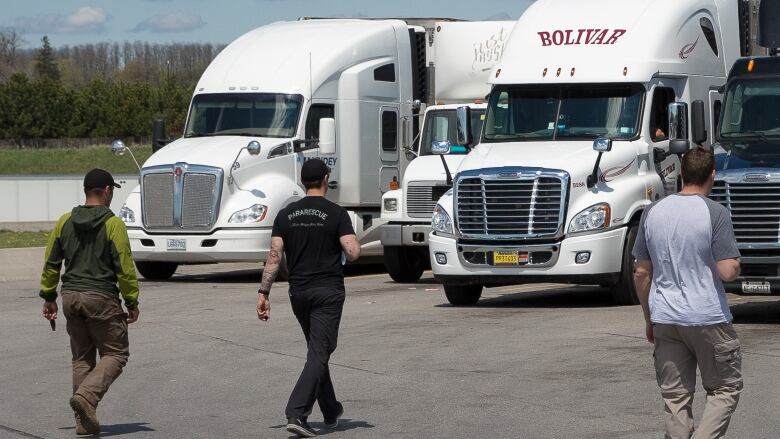What's behind a trucker shortage in Canada? Britain's labour crisis offers a clue
Trucking companies trying to recruit more diverse pool of
drivers as aging workforce nears retirement
While the British government sends in the army to help deliver fuel to gas stations, Canada's trucking industry is watching the crisis unfold with concern as it grapples with its own shortage of truck drivers.
Last week, the labour shortage in Britain strained supply chains and triggered chaotic scenes of panic-buying at the pumps. Since then, British Finance Minister Rishi Sunak said the situation is stabilizing and that sending in the military was an "extra precaution," after the shortage set off a chain reaction that affected everything from petrol and pork to medicine and milk.
"It's pretty scary. We're not at that point so far. And we hope we will never get there," said Marc Cadieux, the president of the Quebec Trucking Association.
He said in Quebec alone, they need somewhere between 2,000 and 3,000 truck drivers.
"Our carriers are complaining that they have the work but they don't have the workers."
In the second quarter of 2021, an average of 18,000 truck driver jobs needed filling in Canada, according to the latest report from Trucking HR Canada, an organization that focuses on addressing workforce issues and challenges in the trucking and logistics sector.
The labour shortage crisis in the United Kingdom came from a perfect storm of factors — the combination of Brexit immigration rules, the impacts of COVID-19, on top of other underlying issues such as an aging workforce and poor working conditions.
Brexit aside, Canada's trucking industry is struggling with some of those same issues.
"Trucks are parked. It means trucking companies aren't moving those goods," Splinter said.
Labour shortages in the trucking industry can quickly ripple out and impact a wide range of sectors, as the United Kingdom has seen in recent weeks.
"We support almost every other essential service — agriculture, manufacturing, forestry, the list goes on," Splinter said. "We're all impacted when we don't have enough drivers."
While the lack of drivers in Canada is only affecting non-essential goods for the time being, she said they need to tackle the problem now to prevent it from getting worse.
Recruiting women, youth and new Canadians
In order to attract more drivers, the Quebec Trucking Association, with financial support from the province, rolled out a campaign called Choose Your Way, or Choisis Ta Route, in French.
They've focused on three major pillars to address shortages in Quebec: recruiting more women, promoting truck-driving jobs to immigrants and retaining as many older drivers as possible.
Currently women represent four per cent of the truck driver workforce in Quebec. The Quebec Trucking Association is aiming to increase that to 10 per cent.
Mark Seymour, CEO of Kriska Transportation Group, said a certain amount of churn is a given in the industry and it's tough to recruit when competing with other jobs that offer a better work-life balance.
Kriska Transportation employs about 900 drivers, and Seymour says that at any given time, 20 to 30 of those jobs are open.
"It's just very frustrating to have that much equipment sitting, when it could otherwise be working."
He said the industry is not at a crisis point yet, but he's worried about what will happen if demand increases and the labour supply continues to shrink.
That's a concern shared by Teamsters Canada, the union representing many of Canada's truck drivers.
"What we're seeing is employers offering those who have recently retired opportunities to come back and drive trucks, because they just cannot get younger people to do the job," said John McCann, the national freight and tankhaul director for Teamsters Canada.
According to McCann, it's difficult to recruit young people in the trucking industry. He gave the example of a friend's son, who had dreamed of being a truck driver since he was a child.
McCann said he helped find him a job that would have paid $60,000-$70,000. It was a day run, meaning no overnight trips, with no inter-provincial travel. Still, he said the young man lasted four days.
"His dad called me up and said, 'John I apologize, he couldn't do it,'" McCann said. The 4 a.m. start time and crossing the Peace Bridge into the U.S. every day turned him off.
McCann says those are the types of stories he's heard about why younger people aren't interested in trucking as a career.
Training expense
One key barrier for new hires is the expense of the training required to get a commercial driver's licence, which can cost between $5,000 and $10,000, depending on the province and the training school.
"Those [younger people] that would consider a career in trucking, those that would consider this blue collar type work, we know we're losing them to other industries. Construction is our number one competition for those workers," said Splinter, with Trucking HR Canada.
"You can go work in construction tomorrow, depending on the job."
She says her organization hopes to see more government subsidies across the country that would make the cost of entry more accessible.


No comments:
Post a Comment